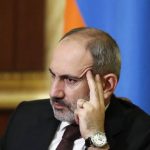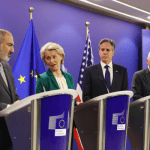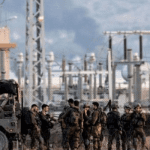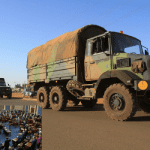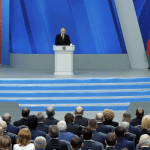President Vladimir Putin has agreed to withdraw Russian troops and border guards from several districts of Armenia, Kremlin spokesman Dmitry Peskov confirmed.
The decision came following a bilateral meeting between Putin and Armenian Prime Minister Nikol Pashinyan in Moscow on Thursday.
The action represents a significant shift in the region’s geopolitical landscape, especially given the withdrawal of almost 2,000 Russian peacekeepers from Nagorno-Karabakh last year.
This pullback came after Azerbaijan used force to recapture the province from Armenia.
The departure of Russian forces marks not just the end of a long-standing military presence in the South Caucasus, but also a shift in geopolitical orientation. For many years, Russia has maintained a military presence in the region, using its position for geopolitical power.
Armenia’s request that Russian border guards quit their posts at Yerevan’s main airport by August 1 demonstrates the country’s desire for more security autonomy.
While the specifics of the army evacuation plan are unknown, Putin and Pashinyan’s agreement indicates a shared awareness of developing regional dynamics.
The announcement raises questions about Armenia’s future security arrangements and its diplomatic relations, especially in the context of broader geopolitical shifts in the South Caucasus.
President Vladimir Putin has agreed to withdraw Russian troops and border guards from several districts of Armenia, Kremlin spokesman Dmitry Peskov confirmed.
The decision came following a bilateral meeting between Putin and Armenian Prime Minister Nikol Pashinyan in Moscow on Thursday.
The action represents a significant shift in the region’s geopolitical landscape, especially given the withdrawal of almost 2,000 Russian peacekeepers from Nagorno-Karabakh last year.
This pullback came after Azerbaijan used force to recapture the province from Armenia.
The departure of Russian forces marks not just the end of a long-standing military presence in the South Caucasus, but also a shift in geopolitical orientation. For many years, Russia has maintained a military presence in the region, using its position for geopolitical power.
Armenia’s request that Russian border guards quit their posts at Yerevan’s main airport by August 1 demonstrates the country’s desire for more security autonomy.
While the specifics of the army evacuation plan are unknown, Putin and Pashinyan’s agreement indicates a shared awareness of developing regional dynamics.
The announcement raises questions about Armenia’s future security arrangements and its diplomatic relations, especially in the context of broader geopolitical shifts in the South Caucasus.
President Vladimir Putin has agreed to withdraw Russian troops and border guards from several districts of Armenia, Kremlin spokesman Dmitry Peskov confirmed.
The decision came following a bilateral meeting between Putin and Armenian Prime Minister Nikol Pashinyan in Moscow on Thursday.
The action represents a significant shift in the region’s geopolitical landscape, especially given the withdrawal of almost 2,000 Russian peacekeepers from Nagorno-Karabakh last year.
This pullback came after Azerbaijan used force to recapture the province from Armenia.
The departure of Russian forces marks not just the end of a long-standing military presence in the South Caucasus, but also a shift in geopolitical orientation. For many years, Russia has maintained a military presence in the region, using its position for geopolitical power.
Armenia’s request that Russian border guards quit their posts at Yerevan’s main airport by August 1 demonstrates the country’s desire for more security autonomy.
While the specifics of the army evacuation plan are unknown, Putin and Pashinyan’s agreement indicates a shared awareness of developing regional dynamics.
The announcement raises questions about Armenia’s future security arrangements and its diplomatic relations, especially in the context of broader geopolitical shifts in the South Caucasus.
President Vladimir Putin has agreed to withdraw Russian troops and border guards from several districts of Armenia, Kremlin spokesman Dmitry Peskov confirmed.
The decision came following a bilateral meeting between Putin and Armenian Prime Minister Nikol Pashinyan in Moscow on Thursday.
The action represents a significant shift in the region’s geopolitical landscape, especially given the withdrawal of almost 2,000 Russian peacekeepers from Nagorno-Karabakh last year.
This pullback came after Azerbaijan used force to recapture the province from Armenia.
The departure of Russian forces marks not just the end of a long-standing military presence in the South Caucasus, but also a shift in geopolitical orientation. For many years, Russia has maintained a military presence in the region, using its position for geopolitical power.
Armenia’s request that Russian border guards quit their posts at Yerevan’s main airport by August 1 demonstrates the country’s desire for more security autonomy.
While the specifics of the army evacuation plan are unknown, Putin and Pashinyan’s agreement indicates a shared awareness of developing regional dynamics.
The announcement raises questions about Armenia’s future security arrangements and its diplomatic relations, especially in the context of broader geopolitical shifts in the South Caucasus.
President Vladimir Putin has agreed to withdraw Russian troops and border guards from several districts of Armenia, Kremlin spokesman Dmitry Peskov confirmed.
The decision came following a bilateral meeting between Putin and Armenian Prime Minister Nikol Pashinyan in Moscow on Thursday.
The action represents a significant shift in the region’s geopolitical landscape, especially given the withdrawal of almost 2,000 Russian peacekeepers from Nagorno-Karabakh last year.
This pullback came after Azerbaijan used force to recapture the province from Armenia.
The departure of Russian forces marks not just the end of a long-standing military presence in the South Caucasus, but also a shift in geopolitical orientation. For many years, Russia has maintained a military presence in the region, using its position for geopolitical power.
Armenia’s request that Russian border guards quit their posts at Yerevan’s main airport by August 1 demonstrates the country’s desire for more security autonomy.
While the specifics of the army evacuation plan are unknown, Putin and Pashinyan’s agreement indicates a shared awareness of developing regional dynamics.
The announcement raises questions about Armenia’s future security arrangements and its diplomatic relations, especially in the context of broader geopolitical shifts in the South Caucasus.
President Vladimir Putin has agreed to withdraw Russian troops and border guards from several districts of Armenia, Kremlin spokesman Dmitry Peskov confirmed.
The decision came following a bilateral meeting between Putin and Armenian Prime Minister Nikol Pashinyan in Moscow on Thursday.
The action represents a significant shift in the region’s geopolitical landscape, especially given the withdrawal of almost 2,000 Russian peacekeepers from Nagorno-Karabakh last year.
This pullback came after Azerbaijan used force to recapture the province from Armenia.
The departure of Russian forces marks not just the end of a long-standing military presence in the South Caucasus, but also a shift in geopolitical orientation. For many years, Russia has maintained a military presence in the region, using its position for geopolitical power.
Armenia’s request that Russian border guards quit their posts at Yerevan’s main airport by August 1 demonstrates the country’s desire for more security autonomy.
While the specifics of the army evacuation plan are unknown, Putin and Pashinyan’s agreement indicates a shared awareness of developing regional dynamics.
The announcement raises questions about Armenia’s future security arrangements and its diplomatic relations, especially in the context of broader geopolitical shifts in the South Caucasus.
President Vladimir Putin has agreed to withdraw Russian troops and border guards from several districts of Armenia, Kremlin spokesman Dmitry Peskov confirmed.
The decision came following a bilateral meeting between Putin and Armenian Prime Minister Nikol Pashinyan in Moscow on Thursday.
The action represents a significant shift in the region’s geopolitical landscape, especially given the withdrawal of almost 2,000 Russian peacekeepers from Nagorno-Karabakh last year.
This pullback came after Azerbaijan used force to recapture the province from Armenia.
The departure of Russian forces marks not just the end of a long-standing military presence in the South Caucasus, but also a shift in geopolitical orientation. For many years, Russia has maintained a military presence in the region, using its position for geopolitical power.
Armenia’s request that Russian border guards quit their posts at Yerevan’s main airport by August 1 demonstrates the country’s desire for more security autonomy.
While the specifics of the army evacuation plan are unknown, Putin and Pashinyan’s agreement indicates a shared awareness of developing regional dynamics.
The announcement raises questions about Armenia’s future security arrangements and its diplomatic relations, especially in the context of broader geopolitical shifts in the South Caucasus.
President Vladimir Putin has agreed to withdraw Russian troops and border guards from several districts of Armenia, Kremlin spokesman Dmitry Peskov confirmed.
The decision came following a bilateral meeting between Putin and Armenian Prime Minister Nikol Pashinyan in Moscow on Thursday.
The action represents a significant shift in the region’s geopolitical landscape, especially given the withdrawal of almost 2,000 Russian peacekeepers from Nagorno-Karabakh last year.
This pullback came after Azerbaijan used force to recapture the province from Armenia.
The departure of Russian forces marks not just the end of a long-standing military presence in the South Caucasus, but also a shift in geopolitical orientation. For many years, Russia has maintained a military presence in the region, using its position for geopolitical power.
Armenia’s request that Russian border guards quit their posts at Yerevan’s main airport by August 1 demonstrates the country’s desire for more security autonomy.
While the specifics of the army evacuation plan are unknown, Putin and Pashinyan’s agreement indicates a shared awareness of developing regional dynamics.
The announcement raises questions about Armenia’s future security arrangements and its diplomatic relations, especially in the context of broader geopolitical shifts in the South Caucasus.




